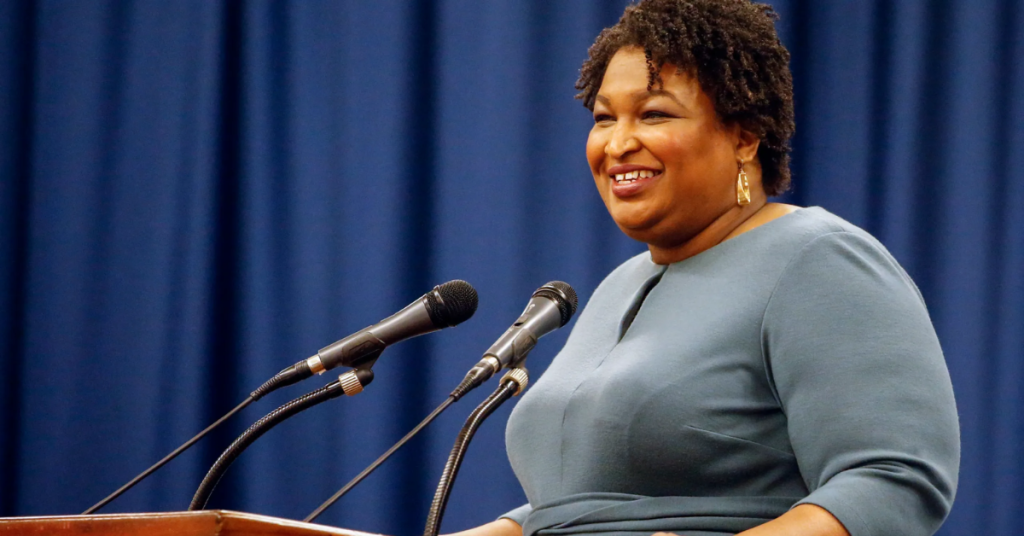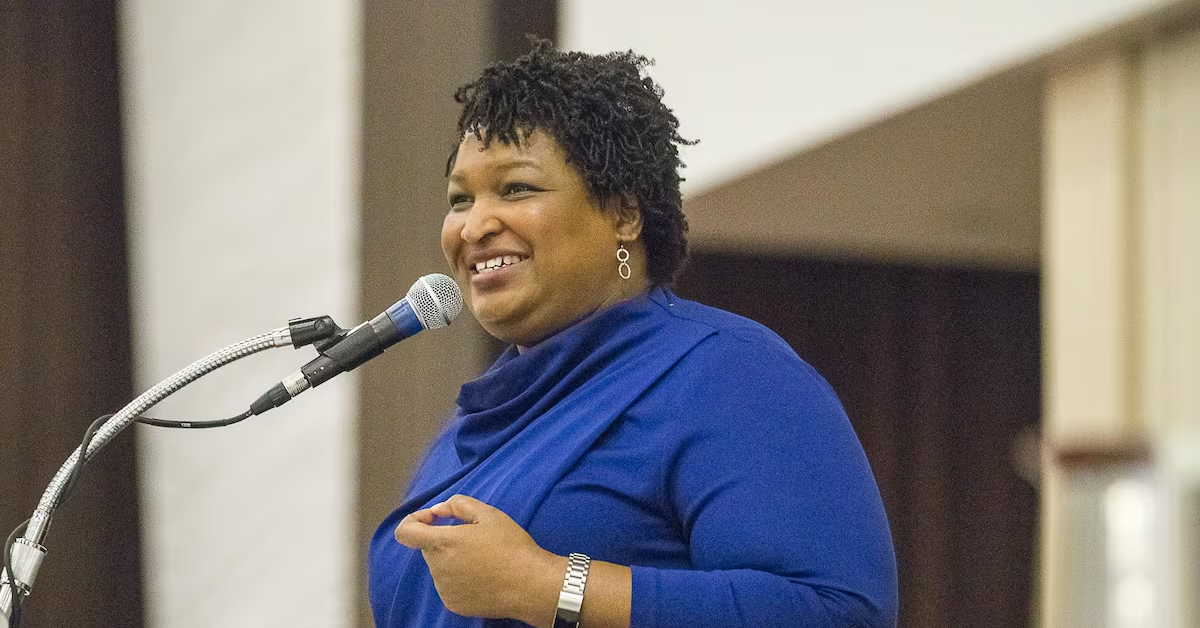Stacey Abrams, the former Minority Leader of the Georgia House of Representatives, remains one of the most prominent figures in Georgia’s political landscape. She first gained widespread recognition in 2018 when she became the first Black woman to run for governor of Georgia.
Her campaign attracted national attention, especially after her vigorous efforts to register voters and mobilise marginalised communities. Despite her high-profile bid, Abrams lost to Republican Brian Kemp in a highly contested race.
However, Abrams’ political journey didn’t end with her defeat. She continued to shape Georgia’s political landscape by championing voting rights and helping to flip the state blue in the 2020 presidential election. Her efforts were widely credited with helping Joe Biden win Georgia, making it the first time the state voted for a Democratic presidential candidate since 1992. Abrams’ influence was undeniable, and she had successfully positioned herself as a leader within the Democratic Party, particularly in Georgia.
But in 2022, Abrams ran for governor once again, only to face a second defeat at the hands of Governor Brian Kemp. The race was another hard-fought battle, but this time, it was clear that the landscape in Georgia had shifted.
While Abrams was still a popular figure within the Democratic Party, she faced a highly organised Republican opposition and a broader national environment that leaned conservative. Kemp’s robust campaign and support from national Republican figures helped him secure re-election.
After her second loss, many assumed that Abrams might step back from politics or pivot to other projects. However, recent developments have raised the question: Will Stacey Abrams run for governor again in 2026? As speculation grows, some political insiders believe that her chances of mounting a third campaign are slim.
While Abrams has not made any definitive statements about her plans, her silence has left the door open for a potential comeback. Republicans, meanwhile, have openly encouraged her to run again, believing that she would be a formidable opponent for Kemp, should he choose to seek re-election in 2026.
The speculation surrounding her political future reached a new peak recently when Abrams spoke to a crowd of young Black women in Atlanta. She reminded her audience that in times of crisis, Democrats must seize opportunities and mobilise against the policies of former President Donald Trump, who is still seen as a major figure in Georgia’s political climate.

Abrams emphasised that her work was far from finished and that Democrats must focus on creating a better future rather than trying to fix a system that has long been broken. Her message was similar to the one she delivered in 2018, just before launching her first gubernatorial run, and it suggested that she still feels deeply connected to the cause.
But much has changed since Abrams’ defeat in 2022. Her standing as the uncontested leader of Georgia Democrats is no longer certain. A new generation of leaders, including U.S. Senators Jon Ossoff and Raphael Warnock, have emerged as powerful figures in the state’s political scene.
Both men helped flip Georgia in 2020, with Ossoff securing a Senate seat and Warnock winning a special election. Their successes have solidified their positions within the party, and they have both positioned themselves as future leaders of Georgia Democrats.
Additionally, the infrastructure that Abrams worked hard to build over the years has faced some setbacks. The powerful voter registration efforts that helped her galvanise support in 2018 and 2020 have suffered from legal and logistical challenges, particularly after the passage of restrictive voting laws in Georgia. Many of the organisations that were central to her past campaigns have struggled to maintain momentum in the face of these obstacles.
Even as her influence has waned in certain areas, Abrams remains a major political figure in Georgia. She continues to speak out on issues of voting rights, criminal justice reform, and economic justice. Her political identity is firmly tied to her advocacy for marginalised communities, and this focus has only grown stronger in the years since her first gubernatorial run. Her speeches often reflect a sense of urgency, with Abrams calling for a radical transformation of the systems that perpetuate inequality in Georgia.
Despite these challenges, some still believe that Abrams could mount a successful third campaign for governor. In fact, Republicans have expressed interest in facing her again, knowing that her presence on the ballot could energise their base and solidify their control of the state. Meanwhile, within the Democratic Party, some believe that Abrams remains their best hope for defeating Kemp, especially if no other viable candidate emerges in the coming years.
While much of the speculation around her future is based on the shifting political climate in Georgia, Abrams herself has not ruled out the possibility of running again. She has remained coy about her plans, perhaps waiting to gauge the political landscape before making a final decision. Her silence is likely a strategic move, as it keeps her options open and allows her to assess the situation without committing to a third run before the time is right.
For now, the question of whether Stacey Abrams will run for governor again in 2026 remains unanswered. As Georgia continues to shift politically, both within the Democratic and Republican parties, her role in the state’s future will remain a subject of debate. Will she rise again to challenge Brian Kemp for a third time, or will a new face take the lead for the Democrats? Only time will tell.
Disclaimer: This article has been meticulously fact-checked by our team to ensure accuracy and uphold transparency. We strive to deliver trustworthy and dependable content to our readers.


